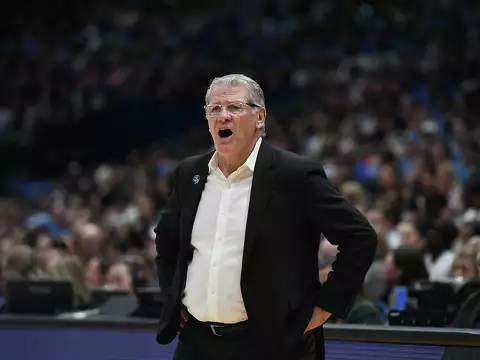UConn women’s basketball coach Geno Auriemma hasn’t been shy about expressing his feelings when it comes to the NCAA Tournament this season.
His Connecticut-based team, as a No. 2 seed, had to fly thousands of miles out West to Spokane, Wash. for the Sweet 16 and Elite. While the Huskies rolled to two victories, it didn’t make the next trip any easier
After tipping off around 9:30 p.m. ET Monday (6:30 local), the UConn team woke up the next morning and flew straight to Tampa, Fl. On Friday night, they played UCLA, a program that qualified a day before UConn. The Bruins didn’t have to make two cross-country flights and got an extra day of rest. Auriemma had already laid into the NCAA about that process earlier in the week.
Friday night, after his team dismantled UCLA 85-51, Auriemma sounded off once again about the tournament format and the fact his team would soon be playing its fourth game in nine days, while the men’s bracket had teams playing four games in 13 days.
“Yeah, we finished Monday night and we play Friday,” Auriemma said. “The guys finish Sunday and they play Saturday. But we’re in this for the student-athletes. No, you’re not. No, you’re not. You’re in it for everything but the student athletes.”
Auriemma’s comments came following a traditional postgame press conference given at a podium. The 40-year head coach of the Huskies has been known to walk off the podium and gather for his own extended press conference with some members of the media in a nearby hallway. There, he might expound upon a performance, talk about the past or, in this case, let his feelings on a topic be known.
Briefly, there was an unusual occurrence after the podium press conference: an NCAA official said “He is no longer allowed to do scrums on site.”
But following pushback from media members, the smaller media session was held. It was unclear why the session was initially shut down.
While his feelings had been simmering for a few weeks and were shared sporadically at press conferences, Auriemma finally let it all out early Saturday morning in a fiery response to a question about the NCAA Tournament format. Unlike the men’s tournament that has four regional round sites, the women have used two in recent years.
They come on your campus all the time and ask you, ‘You have any suggestions?’ and then they leave, and nothing changes,” Auriemma said of the NCAA Tournament organizers.
Auriemma took issue with the notion that the two regional sites would lead to better crowds. Instead, he has expressed frustration that it has actually led to lower overall attendance in comparison to what four sites would draw, all while complicating travel, practice times, and ultimately making it so fewer people can easily access the sites.
“So what you’re saying when you have two regions is you don’t care if half the country can’t get to a game,” Auriemma said. “Basically, that’s what you’re saying. But yeah, you want to grow the game. I mean, come on, it makes no sense. But if you ever had an administrator that ever coached or ever played in a Final Four or regional, and you realize what the limitations are in one gym with eight (teams), right? Yeah, but they don’t think that way. They don’t think that way.
“So, you know, it’s up to us as coaches,” Auriemma continued. “Don’t ask our opinion. If you’re going to dismiss it, at least give it some thought. And (NCAA President Charlie Baker) probably thinks it’s not a big deal that that you fly 3,000 miles get here Tuesday night, when the team you’re playing against has been home already for 36 hours. They probably think that’s not a big deal either. So then what are we trying to say? ‘But we’re in, we’re in this for the student athletes.’ Really? that’s interesting.”
Instead, Auriemma said this all comes down to money.
“You know why they have two regions?” he asked. “So they can cut costs. So they want to do it on the cheap, and then say how much money we’re making. ‘Isn’t the NCAA great look at the new TV package we got.’ And you know how much money we’re making yet? Because we’re short-changing the kids, right, and giving them that best experience.
Auriemma added that, in his view, it comes down to the people behind the decisions.





























